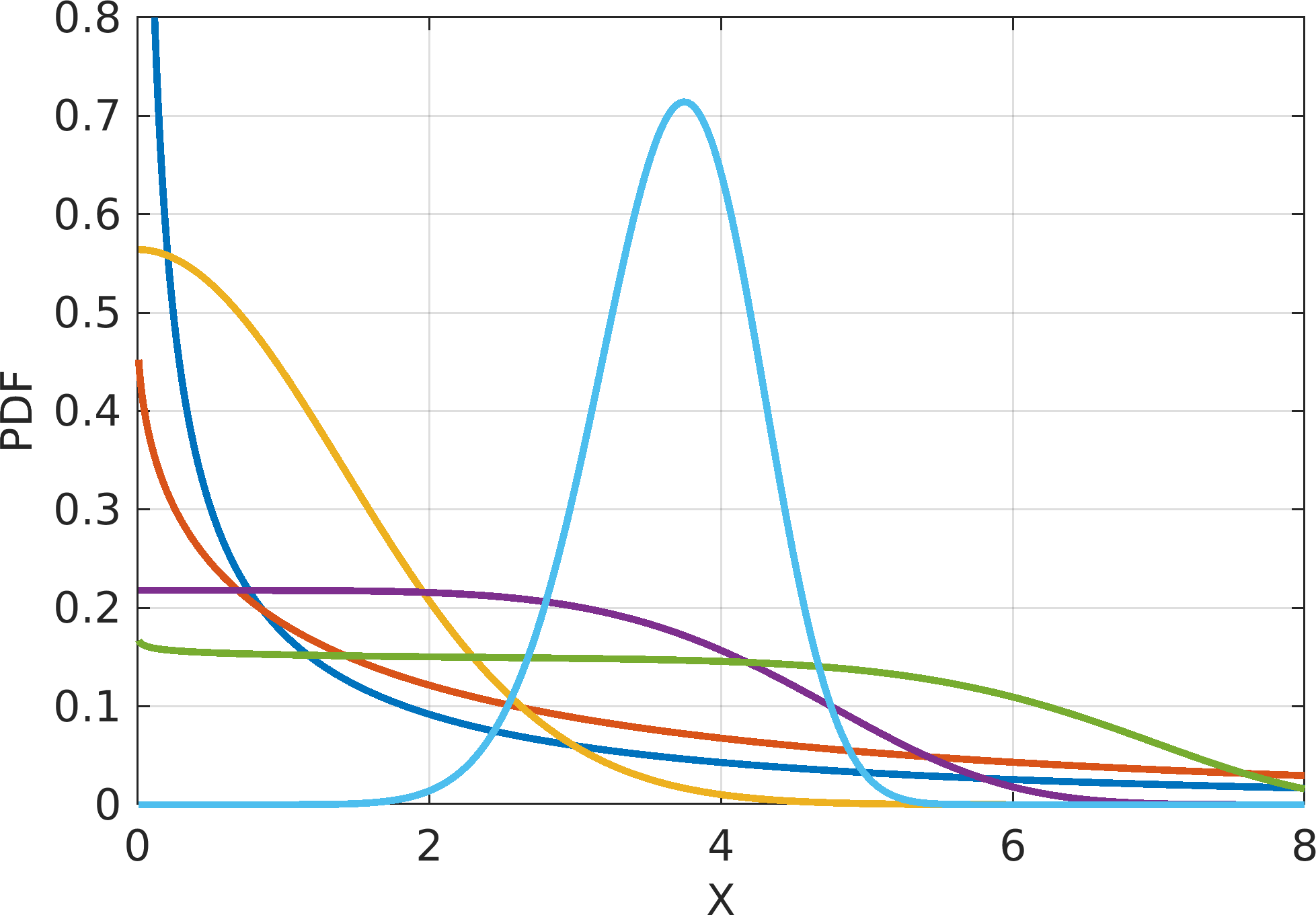
|
ParaMonte MATLAB 3.0.0
Parallel Monte Carlo and Machine Learning Library
See the latest version documentation. |

|
ParaMonte MATLAB 3.0.0
Parallel Monte Carlo and Machine Learning Library
See the latest version documentation. |
Go to the source code of this file.
Functions | |
| function | getLogPDF (in x, in kappa, in invOmega, in invSigma) |
| Return the corresponding natural logarithm(s) of Probability Density Function (PDF) of the input random value(s) from the Generalized Gamma distribution. More... | |
| function getLogPDF | ( | in | x, |
| in | kappa, | ||
| in | invOmega, | ||
| in | invSigma | ||
| ) |
Return the corresponding natural logarithm(s) of Probability Density Function (PDF) of the input random value(s) from the Generalized Gamma distribution.
A variable X is said to be Generalized Gamma (GenGamma) distributed if its PDF with the scale 0 < \sigma < +\infty, shape 0 < \omega < +\infty, and shape 0 < \kappa < +\infty parameters is described by the following equation,
\begin{equation} \large \pi(x | \kappa, \omega, \sigma) = \frac{1}{\sigma \omega \Gamma(\kappa)} ~ \bigg( \frac{x}{\sigma} \bigg)^{\frac{\kappa}{\omega} - 1} \exp\Bigg( -\bigg(\frac{x}{\sigma}\bigg)^{\frac{1}{\omega}} \Bigg) ~,~ 0 < x < \infty \end{equation}
where \eta = \frac{1}{\sigma \omega \Gamma(\kappa)} is the normalization factor of the PDF.
When \sigma = 1, the GenGamma PDF simplifies to the form,
\begin{equation} \large \pi(x) = \frac{1}{\omega \Gamma(\kappa)} ~ x^{\frac{\kappa}{\omega} - 1} \exp\Bigg( -x^{\frac{1}{\omega}} \Bigg) ~,~ 0 < x < \infty \end{equation}
If (\sigma, \omega) = (1, 1), the GenGamma PDF further simplifies to the form,
\begin{equation} \large \pi(x) = \frac{1}{\Gamma(\kappa)} ~ x^{\kappa - 1} \exp(-x) ~,~ 0 < x < \infty \end{equation}
Setting the shape parameter to \kappa = 1 further simplifies the PDF to the Exponential distribution PDF with the scale parameter \sigma = 1,
\begin{equation} \large \pi(x) = \exp(x) ~,~ 0 < x < \infty \end{equation}
The CDF of the Generalized Gamma distribution over a strictly-positive support x \in (0, +\infty) with the three (shape, shape, scale) parameters (\kappa > 0, \omega > 0, \sigma > 0) is defined by the regularized Lower Incomplete Gamma function as,
\begin{eqnarray} \large \mathrm{CDF}(x | \kappa, \omega, \sigma) & = & P\bigg(\kappa, \big(\frac{x}{\sigma}\big)^{\frac{1}{\omega}} \bigg) \\ & = & \frac{1}{\Gamma(\kappa)} \int_0^{\big(\frac{x}{\sigma}\big)^{\frac{1}{\omega}}} ~ t^{\kappa - 1}{\mathrm e}^{-t} ~ dt ~, \end{eqnarray}
where \Gamma(\kappa) represents the Gamma function.
| [in] | x | : The input scalar or array of the same shape as other array-valued arguments, containing the values at which the log(PDF) must be computed. |
| [in] | kappa | : The input scalar or array of the same shape as other array-valued arguments, containing the shape parameter ( \kappa) of the distribution. |
| [in] | invOmega | : The input scalar or array of the same shape as other array-valued arguments, containing the inverse of the second shape parameter ( \omega) of the distribution. |
| [in] | invSigma | : The input scalar or array of the same shape as other array-valued arguments, containing the inverse of the scale parameter ( \sigma) of the distribution. |
logPDF : The output scalar or array of the same shape as other array-valued input arguments of the same type and kind as x containing the PDF of the specified GenGamma distribution.
Possible calling interfaces ⛓
Example usage ⛓

Final Remarks ⛓
If you believe this algorithm or its documentation can be improved, we appreciate your contribution and help to edit this page's documentation and source file on GitHub.
For details on the naming abbreviations, see this page.
For details on the naming conventions, see this page.
This software is distributed under the MIT license with additional terms outlined below.
This software is available to the public under a highly permissive license.
Help us justify its continued development and maintenance by acknowledging its benefit to society, distributing it, and contributing to it.